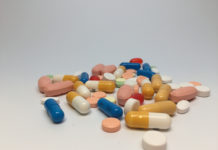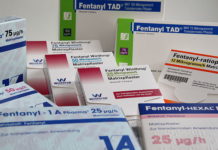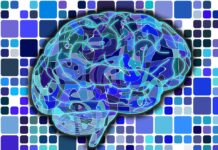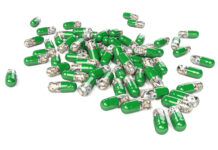Increased Risk of Movement Disorders From Antipsychotics in Persons with Intellectual Disabilities
Large cohort study demonstrates that those with an intellectual disability are at an increased risk for movement disorder side effects of antipsychotics.
British Medical Association Takes On Prescription Drug Dependence
Last year the British Medical Association (BMA) released a report on dependence and withdrawal from prescription drugs including benzodiazepines, z-drugs, opioids, and antidepressants. Now,...
Researchers Find Bias in Industry-Funded Continuing Medical Education
Industry-funded continuing medical education (CME) influences physicians to prescribe more opioids, focus less on the consequences.
“A Decade of Questions over a Paxil Study Vindicated”
Martha Rosenberg calls the reanalysis of Paxil and Study 329 “a victory for safety activists, medical reporters, the public and freedom of the press.” But, she warns, “many pro-pill doctors continue to fight evidence of Paxil’s suicide risks and similar SSRIs.”
Moral Enhancement Technologies are Reportedly Ineffective, Impractical, and Unwise
A new paper published in Bioethics assesses proposals to “enhance morality” through neuropharmacological and neurotechnological interventions.
BPS Releases Review of Alternatives to Antipsychotics
BPS releases report encouraging behavioral interventions for people with dementia, rather than antipsychotics
Inappropriate Use of Antipsychotics on Adults with Intellectual and Developmental Disabilities
One-third of adults with an intellectual or developmental disability are dispensed antipsychotics, despite having no existing psychiatric diagnosis.
“Why Are So Many Children on Antipsychotic Drugs?”
“Do they make people less aggressive? Yes, sometimes they do. Will they sedate people? Absolutely. Will they make kids easier to manage? They will,” Robert Whitaker tells Liz Spikol for Philadelphia Magazine. “But I know of no study that shows that medicating these kids long-term will help them grow up and thrive. The developing brain is a very delicate thing. The narrative is that these side effects are mild, and that’s just not true, and that the benefits are well-established, and so often they’re not.”
Murphy’s Mental Health Bill a Threat to Civil Liberties
In an Op-ed for the Times Union, Madeleine Ringwald explains how the Helping Families in Mental Health Crisis Act “would severely disable protection and advocacy organizations from protecting the civil, legal and human rights of people in mental health services.” “Whether you examine it through a scientific, civil rights or bottom-line lens, Murphy's bill should appall you,” she writes. “Any legislation that bolsters institutionalization at the cost of community-based services seeks not to help those with mental health needs, but help society find ways to hide, suppress and silence them.”
Study Finds Excess Pills Prescribed for Post-Operative Pain
Researchers find that patients are prescribed more pills than necessary after common surgical procedures
“21st Century Cures Act will get Vote this Week”
Several members of Congress spoke this weekend signaling that they were ready to vote on legislation designed to speed federal approval of new drugs...
“Mental Health Care Bill Hits House Amid Concerns”
The Boston Herald reports on mental health care reform bills moving through both houses of Congress. Lawmakers warn, however, “that some aspects of the legislation could create greater barriers to access mental health care for some.”
Poor Evidence and Substantial Bias in Ritalin Studies
The authors of a large scale well-conducted systematic review of methylphenidate, also known as Ritalin, conclude that there is a lack of quality evidence for the drug’s effectiveness. Their research also revealed that Ritalin can cause sleep problems and decreased appetite in children.
Confusion Over Antipsychotic Dosing Data in RAISE Study
Yesterday, the New York Times reported that schizophrenia patients in an experimental treatment program (RAISE) who experienced better outcomes had been on lower doses of antipsychotics than normal. However, the article published in the American Journal of Psychiatry on Tuesday did not divulge any data on the varying antipsychotic drug doses in the different study groups.
Antipsychotics Associated with High Risk of Death in Children
A new study has found that children and adolescents taking a high dose of antipsychotics are almost twice as likely to die of any cause than children on other types of medications.
Children Diagnosed with ADHD Younger are More Likely to get Multiple Medications
New research demonstrates that children diagnosed with ADHD at younger ages are more likely than those diagnosed later to receive multiple medications within five years of their diagnosis.
Most Direct-to-Consumer Drug Advertisements Do Not Adhere to FDA Guidelines
Few DTC drug advertisements fully adhere to FDA guidelines, the overall quality of information provided in DTC advertisements is low, and some advertisements market off-label indications.
“Drugs, Greed and a Dead Boy”
New York Times columnist, Nicholas Kristof, relates the story of Andrew Francesco, a boy who began taking Ritalin at age five and died from complications with Seroquel when he was fifteen. His father, a former pharmaceutical industry executive, reveals the industry’s greed in his memoir “Overmedicated and Undertreated.” Now the industry is pushing for a first-amendment right to market its drugs for off-label uses.
Many Patient Advocacy Organizations Are Funded By Industry
New research investigates the financial conflicts of interest (FCOI) of patient advocacy organizations (PAOs) in the United States.
Pentagon Study Links Prescription Stimulants to Military PTSD Risk
A new study suggests that service members who take stimulant medications to stay alert are five times more likely to suffer from post-traumatic stress disorder, the LA Times reports. “Those who had been prescribed multiple stimulants and the biggest supplies of the drugs were the most likely to have PTSD.”
“For One Condition, the Drugs Came Before the Disorder”
An investigative report in the Milwaukee-Wisconsin Journal Sentinel explores the pharmaceutical industries involvement in the creation of the ‘mental illness’ known as Premenstrual Dysphoric Disorder...
GSK to Face Class Action over Antidepressants for Children
A Sydney, Australia law firm has launched a class action on behalf of people who as children and adolescents were prescribed Glaxosmithkline's drug Paroxetine. Despite...
Members of FDA Advisory Committee Offer Perspectives on Flibanserin Approval in JAMA
In the September issue of The Journal of the American Medical Association (JAMA) three FDA advisory committee members describe the convergence of factors that made the committee’s recommendation to approve flibanserin especially challenging and politically charged.
Pharmaceutical Industry Gifts Linked to Costlier Prescribing Practices
New study finds that pharmaceutical industry gifts to medical providers in Washington D.C. are associated with higher cost, higher volume prescribing behavior.
Has the FDA Abandoned Its Off-Label Promotion Ban?
On Tuesday, the FDA entered into a settlement agreement in Amarin Pharma v. U.S. Food & Drug Administration, allowing Amarin to promote a prescription drug for off-label use, so long as its promotion is truthful and non-misleading. The Amarin Settlement seems to be an abandonment by the federal government of protecting the public from off-label prescriptions. But these settlement were just the cost of doing business for the drug companies, while they continue rake in huge profits from the continued off-label prescribing of drugs, which does not diminish after the settlements. Of course, anything that is false or misleading is still grounds for charges, but that is a far harder case to make. I think the ban against off-label promotion is dead for all practical purposes.






















